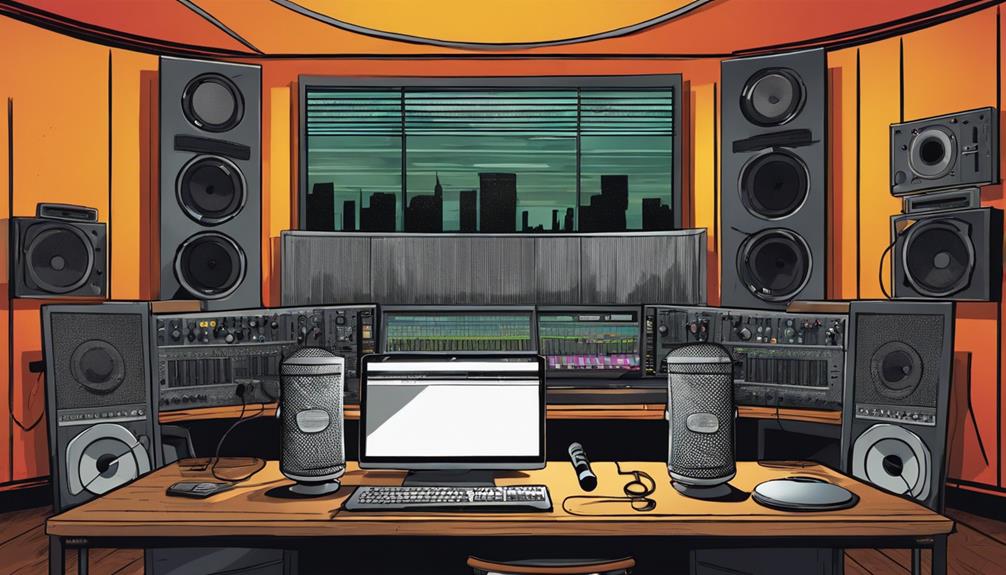To get into a top music school, you'll need to develop a strong foundation in musical skills early on. Take private lessons to build a technical base, participate in ensembles for performance experience, and incorporate music theory to enhance your knowledge. Balance music practice with academic responsibilities, and complement private lessons with community programs. By focusing on developing musical skills, setting realistic goals, and seeking guidance from experienced musicians, you'll be well-prepared for the application process. Now, take the next step and discover the specific strategies and tips to craft a standout application that showcases your unique talents and passions. Understanding how to get into music school also involves highlighting your individuality and passion through personal statements and auditions. Be sure to create a well-rounded application that reflects your dedication, whether through recordings, portfolios, or detailed accounts of your musical journey. Stay organized and start early, ensuring every piece of your application tells the story of your commitment to excelling in music.
Key Takeaways
- Develop a strong foundation in music through private lessons, ensembles, and music theory to enhance musical knowledge and skills.
- Balance music practice with academic responsibilities to maintain a competitive edge and secure music scholarships.
- Research music programs thoroughly, meeting admission requirements and preparing extensively for auditions to increase chances of acceptance.
- Craft a strong application by highlighting unique musical talents, showcasing passion in the personal statement, and securing strong recommendation letters.
- Find the right fit by considering factors such as faculty specialization, school size, atmosphere, and scholarship opportunities to align with personal goals and preferences.
Developing Musical Skills Early
By starting private music lessons early, you'll lay a strong foundation for developing the fundamental skills that music schools look for in prospective students. These individualized lessons will help you build a strong technical base, which is essential for success in music school.
As you progress, you'll want to complement your private lessons with participation in school ensembles and community programs. This will give you valuable performance experience, which is a key component of a well-rounded music education.
Additionally, consider incorporating music theory into your instrumental or voice lessons. This will enhance your musical knowledge and provide a deeper understanding of the music you're performing.
Building a Strong Foundation

To build a strong foundation, you'll need to focus on developing your musical skills, setting realistic goals, and establishing good habits.
By doing so, you'll set yourself up for success and create a sturdy base for your future music education.
With a solid foundation in place, you'll be better equipped to tackle the challenges that come with pursuing a degree in music.
Develop Musical Skills
Develop Musical Skills
You'll need to lay a solid groundwork by mastering fundamental music skills like sight-reading, ear training, and music theory. To achieve technical proficiency, take lessons with a private teacher who can provide personalized guidance and correct any bad habits early on.
Consistent practice is key to developing muscle memory and improving your overall technique. Music theory is essential in understanding the language of music, so make sure you have a solid grasp of it. As you progress, you'll be able to apply theoretical concepts to your playing or singing.
Additionally, participating in ensembles will help you develop your sight-reading skills, as you'll be required to learn new music quickly and accurately. By focusing on these fundamental skills, you'll be well-prepared for the demands of music school and set yourself up for success in your music career.
Set Realistic Goals
One essential step in preparing for music school is setting realistic goals that focus on building a strong musical foundation through consistent practice and dedication. To achieve this, create a structured practice routine that balances technique, repertoire, and musicality. This will help you make the most of your time and guarantee steady progress.
| Aspect | Goal | Action |
|---|---|---|
| Technique | Master scales and arpeggios | Practice 30 minutes daily |
| Repertoire | Learn 3 new pieces | Focus on 1 piece per month |
| Musicality | Improve expression and phrasing | Record yourself and reflect |
Seek guidance from experienced musicians or teachers to help set achievable and meaningful goals. They can provide valuable insights into the requirements and expectations of music schools, ensuring your goals align with their standards. Additionally, reflect on your strengths and areas for improvement to tailor your goals to your individual musical journey. By setting realistic goals and working towards them, you'll be well on your way to a successful music school application.
Establish Good Habits
You'll lay the groundwork for a successful music school application by establishing good habits that foster discipline, improve skills, and build a strong foundation in music theory, technique, and performance.
A consistent practice routine is essential to develop discipline and improve skills over time. Focus on building strong fundamentals in music theory, technique, and performance, as these are the essential building blocks of a successful music career.
Seek guidance from experienced musicians or teachers to set achievable goals and identify areas for improvement. Incorporate effective practice techniques, such as breaking down complex skills into smaller tasks, to maximize progress and learning.
Additionally, cultivate a positive mindset towards learning and growth to stay motivated and dedicated. By establishing good habits, you'll set yourself up for success and create a strong foundation for your music education.
Balancing Music and Academics

By mastering the delicate art of balancing music and academics, aspiring music students can set themselves up for success in both areas, laying the groundwork for a well-rounded education and a competitive edge in college auditions.
It's essential to maintain a balanced curriculum, excelling in academics while pursuing music studies, without compromising one for the other. Juggling music practice and academic responsibilities early on helps set a strong foundation for college auditions.
Private lessons from an early age can give students a competitive edge for admission into music schools. Moreover, music scholarships are available for students, even those not majoring in music, highlighting the importance of balancing music and academics.
Exploring Music School Options

As you explore the world of music education, it's important to distinguish between music departments, schools of music, and conservatories, understanding how each type of institution can influence your musical journey and career prospects.
Schools of music often offer a more well-rounded education, combining performance training with music theory, history, and education courses.
Conservatories, on the other hand, tend to focus on excellence in performance training, with a more specialized curriculum.
When researching music school options, consider the faculty members, facilities, and ensembles available. These factors can greatly impact your music education experience and future opportunities in the industry.
Will you thrive in a school with a strong focus on performance, or do you need a more diverse education? Researching these aspects will help you find the best fit for your goals.
Preparing for Applications

When preparing to apply to music schools, it's crucial to research the specific audition requirements and deadlines for each program you're interested in.
You'll need to meet the admission requirements, which can vary greatly from one school to another.
Research Music Programs
Research music programs thoroughly to understand their unique strengths, requirements, and opportunities that align with your goals and aspirations. As you explore your research, look beyond the program's reputation and examine the faculty profiles. Identify professors who specialize in your area of interest and have a track record of mentoring students with similar goals.
Next, scrutinize the curriculum structure to guarantee it provides a well-rounded education that meets your needs. Performance opportunities are also vital, so investigate the types of ensembles, concerts, and recitals available. Additionally, consider the facilities, resources, and technology at your disposal, as these will greatly impact your learning experience.
Meet Admission Requirements
Now that you've identified your top music programs, it's time to focus on meeting their admission requirements, an essential step in getting accepted into your dream school. Each school has its unique set of requirements, so it's important to research and understand what they're looking for.
Here are some key things to keep in mind:
- Check specific admission requirements: Review the audition repertoire, academic prerequisites, and other requirements for each school.
- Get your documents in order: Make sure you have a polished resume, personal statement, and letters of recommendation ready for submission.
- Prepare for auditions: Practice your chosen repertoire extensively and seek feedback from teachers to make sure you're performance-ready.
- Meet application deadlines: Submit all required materials promptly to increase your chances of acceptance.
Additionally, research the faculty members at each school to understand their specialties and tailor your application accordingly. By meeting the admission requirements, you'll be well on your way to getting accepted into your dream music school.
Crafting a Strong Application

When applying to music school, you'll need to craft an application that showcases your unique musical talents and passions, and a strong start begins with highlighting your musical achievements and experiences. This will demonstrate your dedication and commitment to your craft.
Next, make sure your audition repertoire is well-rounded and versatile, showcasing your skills in different genres and styles. Your personal statement should also be tailored to demonstrate your passion for music, highlighting what drives you and what you hope to achieve in your music career.
Don't forget to secure strong recommendation letters from music teachers or mentors who can speak to your abilities and potential. Finally, ensure to meet all application deadlines and requirements to make a good impression. A complete and timely application will show that you're responsible and serious about pursuing a music degree.
Finding the Right Fit

To guarantee a successful and fulfilling music education, you need to find a music school that aligns with your artistic vision, learning style, and career goals. This is essential in helping you stay motivated and focused throughout your studies.
Here are some key factors to take into account when searching for the right fit:
- Teaching style and specialization: Make sure that the music school offers teachers with expertise in your desired genre or instrument.
- Size, atmosphere, and culture: Consider the size of the school, the atmosphere, and the culture to determine if it's a good fit for you.
- Reputation, facilities, and location: Research the school's reputation, facilities, and location to make sure it meets your standards.
- Scholarship opportunities and financial aid: Look into the availability of scholarships and financial aid to help fund your education.
Frequently Asked Questions
How to Be Successful in Music School?
To be successful in music school, you'll need to build strong relationships, prioritize professionalism, practice diligently, and seek feedback. By doing so, you'll stand out, grow artistically, and set yourself up for future success.
Is It Hard to Get Into Music School?
"When it rains, it pours," and getting into music school can be a storm. With acceptance rates as low as 5-10%, you'll need exceptional talent, rigorous preparation, and a well-rounded application to stand out in the crowded pool.
What Makes a Good Music Student?
To be a good music student, you'll need dedication, regular practice, and a strong work ethic. You'll also engage in ensembles, seek feedback, and show passion, while communicating effectively and being open to growth.
How Do You Attract More Music Students?
To attract more music students, you should offer diverse programs and ensembles, showcase successful alumni, provide performance and composition opportunities, and advertise scholarships to create a welcoming environment that fosters creativity.
Conclusion
By following these tips, you'll be well on your way to getting accepted into music school.
For example, let's say you're a high school junior who's been playing the violin since age 10. You've practiced diligently, taken music theory classes, and even performed in your school's orchestra.
By balancing your music pursuits with solid grades and a strong application, you'll increase your chances of getting into a top music program, like the Juilliard School or Berklee College of Music.










